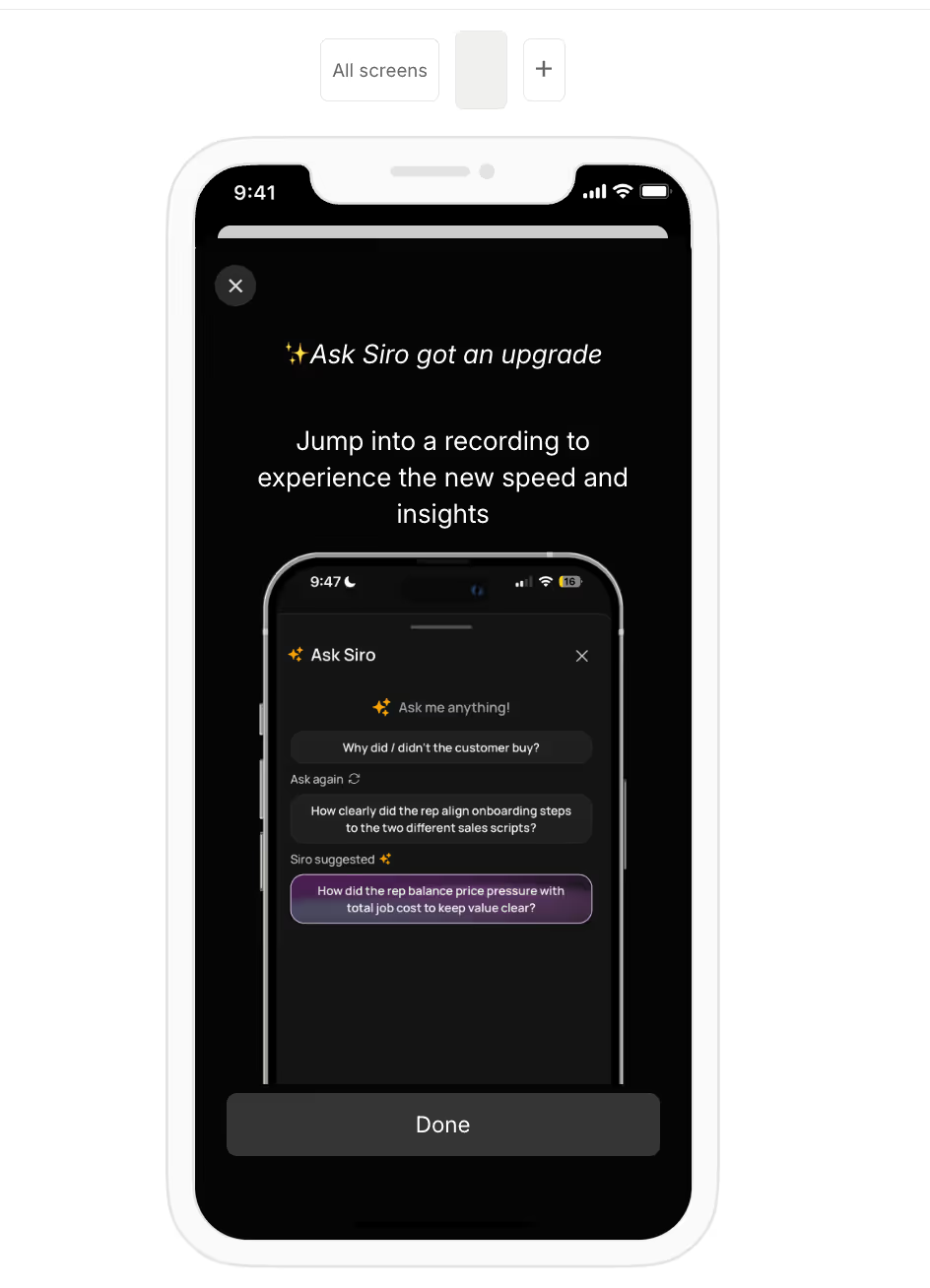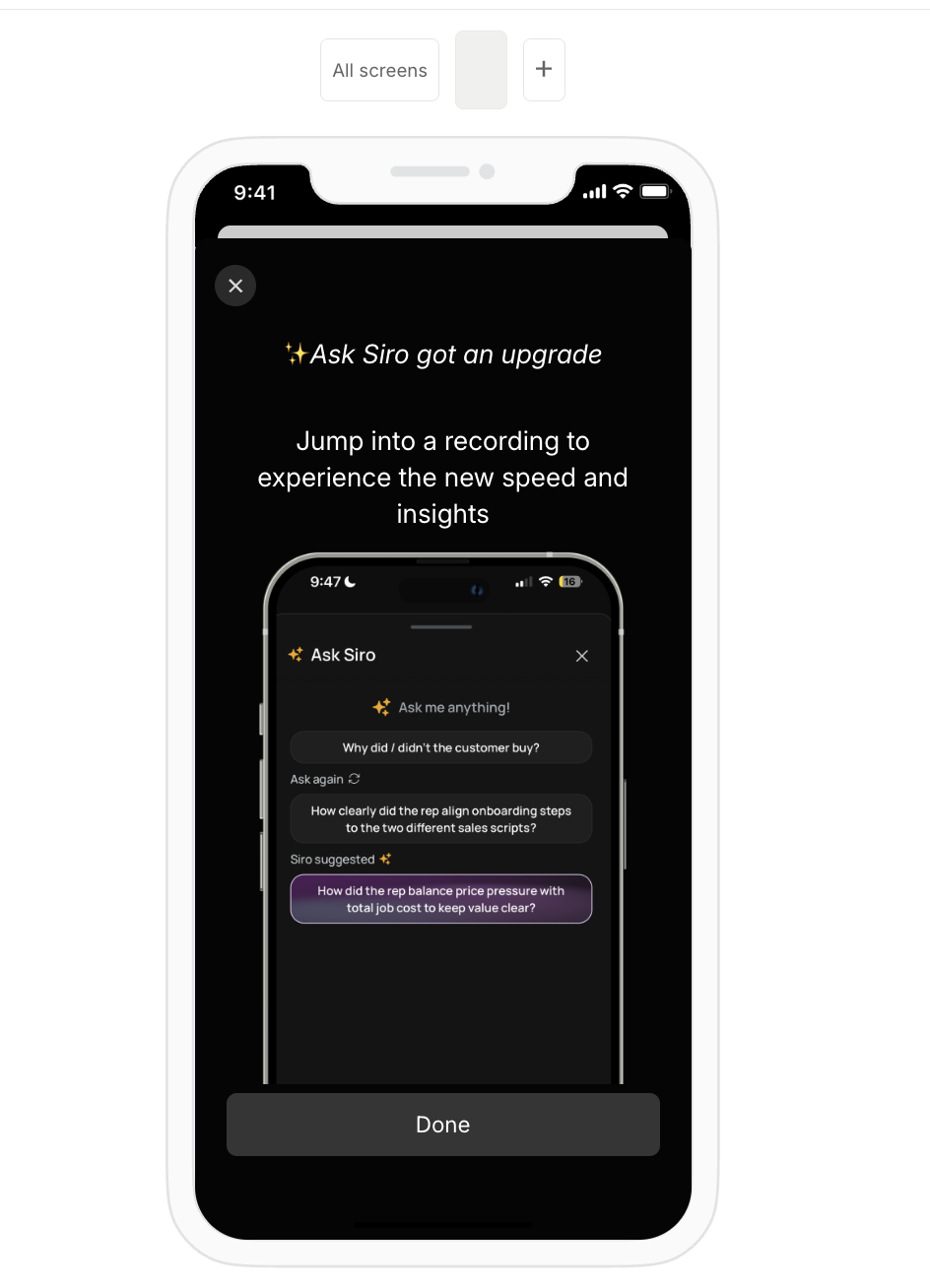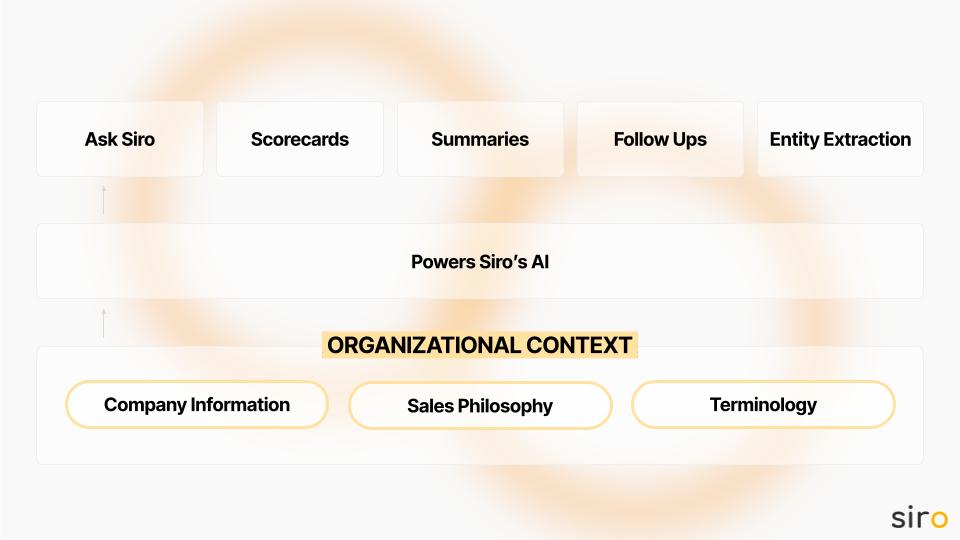
How to Fix Training for Field Sales Reps

.jpg)
Sales obeys the 80/20 rule. There are no average reps. The top 20% of reps at every organization out-sell the bottom 80%, and I saw this in action when I managed a team of door-to-door sales reps at Cutco. Cutco has some of the best sales training on the planet, but even with all that training, the 80/20 rule applied.

Without fail, we see the same pattern across all of Siro’s customers. When we get access to company data we see the top 20% of reps are responsible for most of the revenue the company brings in. Everyone else is barely making it.
Why is nobody talking about this? I think it’s always been this way, and until recent breakthroughs in AI, nobody had a solution.
Most struggling reps could become exceptional, they just need the right coaching to replicate the behavior of top reps. But there’s never enough coaching to go around. Siro’s vision is to make world class sales training abundant so that field sales is the most accessible path to financial freedom.
So what’s wrong with the status quo of sales training?
Status Quo: field sales training
Remember your first day in sales?
You show up and they toss you in a conference room with some coffee and a doughnut so you can sit in a chair under fluorescent lighting to “learn how to sell.” They hand you a playbook and give you one, maybe two days of training, run you through a bit of role playing, and then you shadow someone for a day or two before you’re on your own knocking doors.
This is a sink or swim situation, and what happens is that the reps who are naturally gifted succeed, and the rest will fail without understanding why.
Let’s break down why sales training is failing us.
Role playing isn’t good sales training
Because everyone knows it’s fake.
Role playing does a terrible job of demonstrating why the sales process works because everyone in the room knows that it’s not a real environment. They’re all nodding their heads and playing along, but everyone knows a real sale will be completely different.
On the Day 2 of Cutco training, we’d have one of the best reps come roleplay their whole demo to the class with two of the attendees playing their prospects. This is someone that we knew was crushing it, making tons of money, and they were going to show us how they do it. We’d pick the 2 most popular people in class, pronounce them “husband and wife” and have them sit down to get pitched Cutco, give objections, etc.
It’s funny, but it’s not real.
The “husband and wife” haven’t talked to a real Cutco customer before, and they have no idea how customers act, so they can’t behave anything like how a customer will behave. Their objections won’t be the real objections, and there’s no money on the line so when they get closed, there's nothing at stake, so when the rep does those tactics that advance the sale it doesn’t make sense to the new reps.
There’s a lot of things in sales where it doesn’t make sense at first. The playbook says that you should do something like ask a particular leading question to get the first “yes” from the prospect, and it makes zero sense until you do it for real and watch it work exactly like they told you it would.
The result is that a lot of reps may not trust the roleplay examples, and so they won’t follow the playbook.
Shadowing isn’t enough
After the training, you go into the field to shadow a manager or top rep for a couple of days to see how they do it,. The luckiest reps will get to shadow for 2 weeks, but training is expensive and most companies can’t afford it. Most new reps get a few days training and a day or two selling with a manager shadowing them.
Learning how to sell is a series of little tweaks that build on each other into a full pitch and close. Unless you came out of the womb a genetic outlier, it takes more than a day or two of watching someone else sell to learn your own flavor of how to close.
What’s more, sales skills are perishable and require constant training and tuning well past the shadowing period. That’s why you see reps go from crushing it to struggling overnight. They didn’t realize they changed something in their pitch, and they need some coaching to pull out of their bageling streak.
Reimagining Field Sales Training with Siro and AI
Siro is AI Training for Field Sales. We record and transcribe every conversation, and our AI automatically identifies top moments at every stage of the sale from the best performing reps so that sales managers can build sales training with real audio examples.
When you leverage real call recordings from Siro in your sales training, rep is stae down their first door having heard tons of real examples of real top performers handling every part of the call in advance. They can approach every part of the call with greater confidence as a result.
Take the previous training, and imagine instead of just a printed playbook for folks to read and memorize, you can play a real audio example of real reps closing real deals with real customers. Audio examples from top sales people give new reps a real taste for how the sales process will feel and help them sell more, faster.
Real audio from real reps makes a huge difference
Here’s a powerful example from the Cutco playbook that new reps stumble over.
Right after you show them the knife set, you’re supposed to ask them “which color would look better in your kitchen?” it’s really important to say “in your kitchen / on your counter” not “which color do you like better”. If you ask them what they like, they’ll stay connected to what you have in front of you, but if you ask them to visualize it in the kitchen, they now have a mental image of the knife block in their house. And this can lead to them comparing these knives with their current knives that they’re unhappy with, which makes them realize they may actually really want to invest in a new set of knives.
New reps will doubt that this actually makes a difference, or they worry that it’s a little manipulative. But when they listen to top reps ask the question, they’ll hear the customer get excited and talk about where it would go in the kitchen so they can have easy access to it when they’re preparing food. Hearing someone’s genuine excitement for the product helps the new rep realize the question builds value in the mind of a prospect.
The reality is that you really can’t get someone to buy something that they don’t actually want. If you failed to sell something, it’s often because you failed to use the playbook to have a helpful conversion about why the thing is useful for them.
Sales playbooks exist for a reason. They’re the best way to sell a product, but memorizing the playbook word-for-word doesn’t tell you how to deliver the pitch in a way that doesn’t sound like an injury law firm. You’re told to memorize the playbook (At Cutco, we would encourage new reps to literally have the playbook in their hands and to read from it for the first few days to get to memorize it).
But sales playbooks don’t teach you how to deliver the material effectively. Audio is much better at that.
Delivery example: minimizing vs maximizing
When you’re quoting price, typically there’s a pre-close price conditioning, where you mention a competitor product that costs more than your product, and then talk about how little your thing costs in comparison.
At Cutco, we would compare our knives to the really expensive German Wusthof brand. We’d say,
“Now, the next obvious question is what kind of investment does this knife set look like. And I’m sure you wouldn’t compare Cutco to the discount knives at your local pharmacy, and you also wouldn’t compare them to a chef’s set that costs $12k.”
That conditions them to a price and quality range that knives fall within. $12k anchors high, and makes the range of Cutco knives of several hundred to around a grand sound reasonable in comparison. But then you drive the point home with a comparison to Wusthof, and you maximize how you deliver the Wusthof cost.
“A comparable Wustof set costs about Three thousand…two…hundred…dollars”
And when you say the Cutco price, you speak a bit softer, a bit faster, and say bucks rather than dollars.
“In comparison, this Cutco set in your kitchen only costs $1200 bucks.”
Delivery example: Pitching up
Pitching up is where you sound like you’re asking a question when you get to a place you feel emotionally uncomfortable, like pricing or when you get close to the close. You feel uncertain, and that feeling shows up in your voice.
To understand pitching up, just add a ‘?’ after what you’re saying: “Here’s what we’re doing for pricing?”
Most new reps will pitch up when they first start, and if they’re doing it in one spot of the pitch, they’re probably doing it all over the place.
Pitching up kills deals. We’ve seen reps go from bageling all morning, send a note to managers to listen to their calls on Siro from that day, and then get note back saying, “you’re pitching up. Stop.” The rep goes on to close 2 deals that day.
Delivery example: Pausing
New reps will often rush through the material in the pitch. They’ve just memorized it all, and they’re focused on getting to the end rather than looking for cues that the prospect is engaged and learning about the product. Over time, reps learn that it’s critical to learn how and when to pause for new information to sink in
The whole reason that the company hired them is because the sale is complex and requires a bit of education before someone is willing to make a purchase. You can’t just sell it like you would a t-shirt on an Instagram ad.
Listening to real reps STOP talking, use silence strategically in their conversations, shows you that in sales the goal isn’t to speak, the goal is to listen and to be heard.
Conclusion
We’re excited about the opportunity to AI training and turn a generation of sales reps into top performers. At Siro, we want to make field sales the most accessible path to financial freedom, and we want to help thousands of businesses grow.
Join us: https://www.siro.ai/book-a-demo

.webp)






